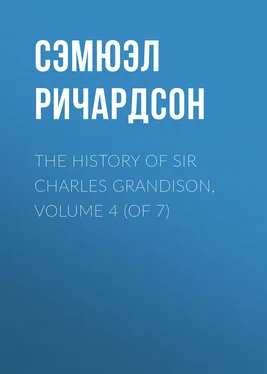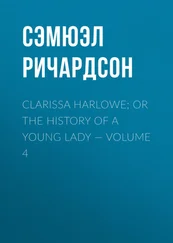Сэмюэл Ричардсон - The History of Sir Charles Grandison, Volume 4 (of 7)
Здесь есть возможность читать онлайн «Сэмюэл Ричардсон - The History of Sir Charles Grandison, Volume 4 (of 7)» — ознакомительный отрывок электронной книги совершенно бесплатно, а после прочтения отрывка купить полную версию. В некоторых случаях можно слушать аудио, скачать через торрент в формате fb2 и присутствует краткое содержание. Жанр: literature_18, foreign_antique, foreign_prose, foreign_sf, на английском языке. Описание произведения, (предисловие) а так же отзывы посетителей доступны на портале библиотеки ЛибКат.
- Название:The History of Sir Charles Grandison, Volume 4 (of 7)
- Автор:
- Жанр:
- Год:неизвестен
- ISBN:нет данных
- Рейтинг книги:3 / 5. Голосов: 1
-
Избранное:Добавить в избранное
- Отзывы:
-
Ваша оценка:
- 60
- 1
- 2
- 3
- 4
- 5
The History of Sir Charles Grandison, Volume 4 (of 7): краткое содержание, описание и аннотация
Предлагаем к чтению аннотацию, описание, краткое содержание или предисловие (зависит от того, что написал сам автор книги «The History of Sir Charles Grandison, Volume 4 (of 7)»). Если вы не нашли необходимую информацию о книге — напишите в комментариях, мы постараемся отыскать её.
The History of Sir Charles Grandison, Volume 4 (of 7) — читать онлайн ознакомительный отрывок
Ниже представлен текст книги, разбитый по страницам. Система сохранения места последней прочитанной страницы, позволяет с удобством читать онлайн бесплатно книгу «The History of Sir Charles Grandison, Volume 4 (of 7)», без необходимости каждый раз заново искать на чём Вы остановились. Поставьте закладку, и сможете в любой момент перейти на страницу, на которой закончили чтение.
Интервал:
Закладка:
CHARLES GRANDISON.
Sir Charles, I remember, as the doctor read, mentions getting leave for his Beauchamp to come over, who, he says, will supply his absence to him —But, ah, Lucy! Who, let me have the boldness to ask, shall supply it to your Harriet? Time, my dear, will do nothing for me, except I could hear something very much amiss of this man.
I have a great suspicion, that the first part of the letter enclosed was about me. The doctor looked so earnestly at me, when he skipt two sides of it; and, as I thought, with so much compassion!—To be sure, it was about me.
What would I give to know as much of his mind as Dr. Bartlett knows! If I thought he pitied the poor Harriet—I should scorn myself. I am, I will be, above his pity, Lucy. In this believe your
HARRIET BYRON.
LETTER VII
MISS BYRON.—IN CONTINUATION SUNDAY NIGHT, APRIL 2
Dr. Bartlett has received from Sir Charles an account of what passed last Friday between him and Sir Harry and Lady Beauchamp. By the doctor's allowance, I enclose it to you.
In this letter, Lucy, you will see him in a new light; and as a man whom there is no resisting, when he resolves to carry a point. But it absolutely convinces me, of what indeed I before suspected, that he has not an high opinion of our sex in general: and this I will put down as a blot in his character. He treats us, in Lady Beauchamp, as perverse humoursome babies, loving power, yet not knowing how to use it. See him so delicate in his behaviour and address to Miss Mansfield, and carry in your thoughts his gaiety and adroit management to Lady Beauchamp, as in this letter, and you will hardly think him the same man. Could he be any thing to me, I should be more than half afraid of him: yet this may be said in his behalf;—He but accommodates himself to the persons he has to deal with:—He can be a man of gay wit, when he pleases to descend, as indeed his sister Charlotte has as often found, as she has given occasion for the exercise of that talent in him:—Yet, that virtue, for its own sake, is his choice; since, had he been a free liver, he would have been a dangerous man.
But I will not anticipate too much: read it here, if you please.
LETTER VIII
SIR CHARLES GRANDISON, TO DR. BARTLETT [ENCLOSED IN THE PRECEDING.] GRANDISON HALL, FRIDAY NIGHT, MARCH 31
I arrived at Sir Harry Beauchamp's about twelve this day. He and his lady expected me, from the letter which I wrote and shewed you before I left the town; in which, you know, I acquainted Sir Harry with his son's earnest desire to throw himself at his feet, and to pay his duty to his mother, in England; and engaged to call myself, either this day or to-morrow, for an answer.
Sir Harry received me with great civility, and even affection. Lady Beauchamp, said he, will be with us in a moment. I am afraid you will not meet with all the civility from her on the errand you are come upon, that a man of Sir Charles Grandison's character deserves to meet with from all the world. We have been unhappy together, ever since we had your letter. I long to see my son: your friendship for him establishes him in my heart. But—And then he cursed the apron-string tenure, by which, he said, he held his peace.
You will allow me, Sir Harry, said I, to address myself in my own way to my lady. You give me pleasure, in letting me know, that the difficulty is not with you. You have indeed, sir, one of the most prudent young men in the world for your son. His heart is in your hand: you may form it as you please.
She is coming! She is coming! interrupted he. We are all in pieces: we were in the midst of a feud, when you arrived. If she is not civil to you—
In swam the lady; her complexion raised; displeasure in her looks to me, and indignation in her air to Sir Harry; as if they had not had their contention out, and she was ready to renew it.
With as obliging an air as I could assume, I paid my compliments to her. She received them with great stiffness; swelling at Sir Harry: who sidled to the door, in a moody and sullen manner, and then slipt out.
You are Sir Charles Grandison, I suppose, sir, said she; I never saw you before: I have heard much talk of you.—But, pray, sir, are good men always officious men? Cannot they perform the obligations of friendship, without discomposing families?
You see me now, madam, in an evil moment, if you are displeased with me: but I am not used to the displeasure of ladies: I do my utmost not to deserve it; and, let me tell you, madam, that I will not suffer you to be displeased with me.
I took her half-reluctant hand, and led her to a chair, and seated myself in another near her.
I see, sir, you have your arts.
She took the fire-screen, that hung by the side of the chimney, and held it before her face, now glancing at me, now turning away her eye, as if resolved to be displeased.
You come upon a hateful errand, sir: I have been unhappy ever since your officious letter came.
I am sorry for it, madam. While you are warm with the remembrance of a past misunderstanding, I will not offer to reason with you: but let me, madam, see less discomposure in your looks. I want to take my impressions of you from more placid features: I am a painter, madam: I love to draw lady's pictures. Will you have this pass for a first sitting?
She knew not what to do with her anger: she was loath to part with it.
You are impertinent, Sir Charles—Excuse me—You are impertinent.
I do excuse you, Lady Beauchamp: and the rather, as I am sure you do not think me so. Your freedom is a mark of your favour; and I thank you for it.
You treat me as a child, sir—
I treat all angry people as children: I love to humour them. Indeed, Lady Beauchamp, you must not be angry with me. Can I be mistaken? Don't I see in your aspect the woman of sense and reason?—I never blame a lady for her humoursomeness, so much as, in my mind, I blame her mother.
Sir! said she. I smiled. She bit her lip, to avoid returning a smile.
Her character, my dear friend, is not, you know, that of an ill-tempered woman, though haughty, and a lover of power.
I have heard much of you, Sir Charles Grandison: but I am quite mistaken in you: I expected to see a grave formal young man, his prim mouth set in plaits: But you are a joker; and a free man; a very free man, I do assure you.
I would be thought decently free, madam; but not impertinent. I see with pleasure a returning smile. O that ladies knew how much smiles become their features!—Very few causes can justify a woman's anger—Your sex, madam, was given to delight, not to torment us.
Torment you, sir!—Pray, has Sir Harry—
Sir Harry cannot look pleased, when his lady is dis-pleased: I saw that you were, madam, the moment I beheld you. I hope I am not an unwelcome visitor to Sir Harry for one hour, (I intend to stay no longer,) that he received me with so disturbed a countenance, and has now withdrawn himself, as if to avoid me.
To tell you the truth, Sir Harry and I have had a dispute: but he always speaks of Sir Charles Grandison with pleasure.
Is he not offended with me, madam, for the contents of the letter—
No, sir, and I suppose you hardly think he is—But I am—
Dear madam, let me beg your interest in favour of the contents of it.
She took fire—rose up—
I besought her patience—Why should you wish to keep abroad a young man, who is a credit to his family, and who ought to be, if he is not, the joy of his father? Let him owe to your generosity, madam, that recall, which he solicits: it will become your character: he cannot be always kept abroad: be it your own generous work—
What, sir—Pray, sir—With an angry brow–
You must not be angry with me, madam—(I took her hand)—You can't be angry in earnest—
Читать дальшеИнтервал:
Закладка:
Похожие книги на «The History of Sir Charles Grandison, Volume 4 (of 7)»
Представляем Вашему вниманию похожие книги на «The History of Sir Charles Grandison, Volume 4 (of 7)» списком для выбора. Мы отобрали схожую по названию и смыслу литературу в надежде предоставить читателям больше вариантов отыскать новые, интересные, ещё непрочитанные произведения.
Обсуждение, отзывы о книге «The History of Sir Charles Grandison, Volume 4 (of 7)» и просто собственные мнения читателей. Оставьте ваши комментарии, напишите, что Вы думаете о произведении, его смысле или главных героях. Укажите что конкретно понравилось, а что нет, и почему Вы так считаете.












